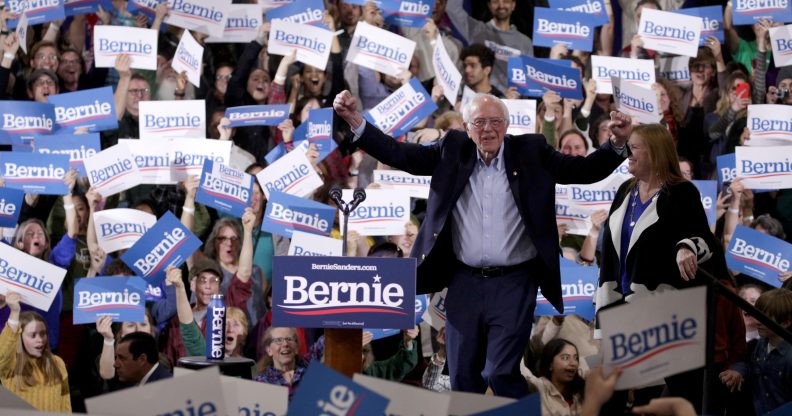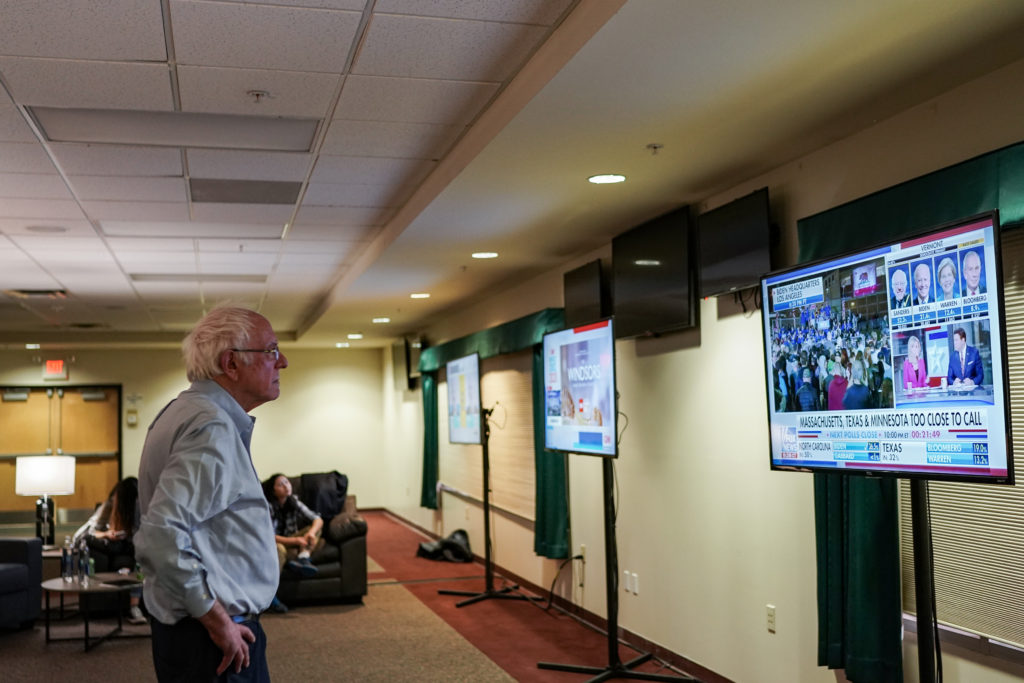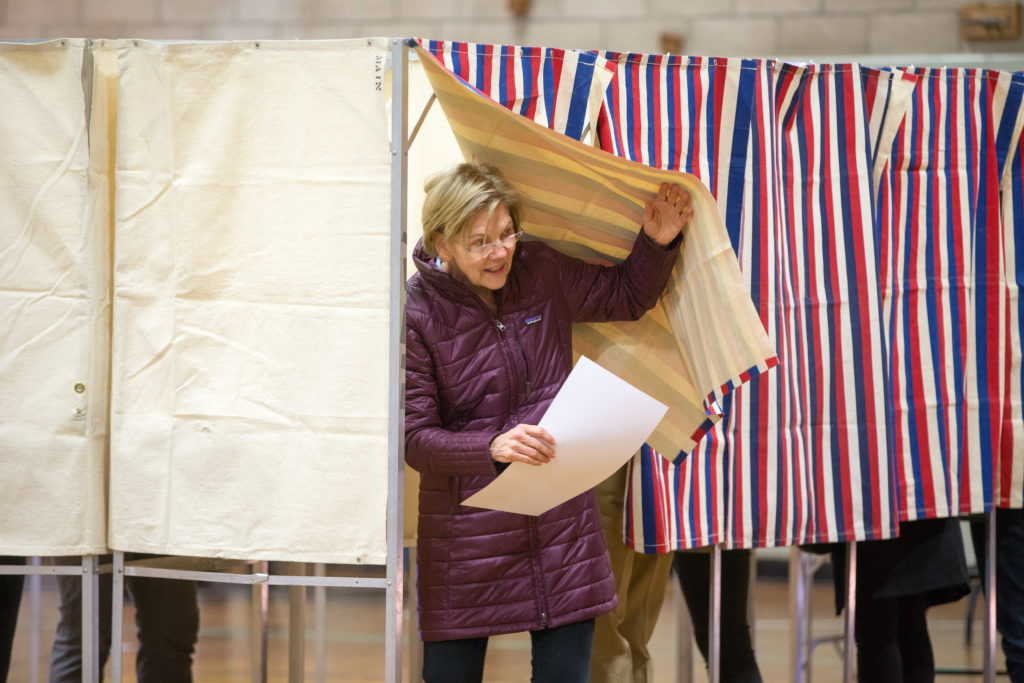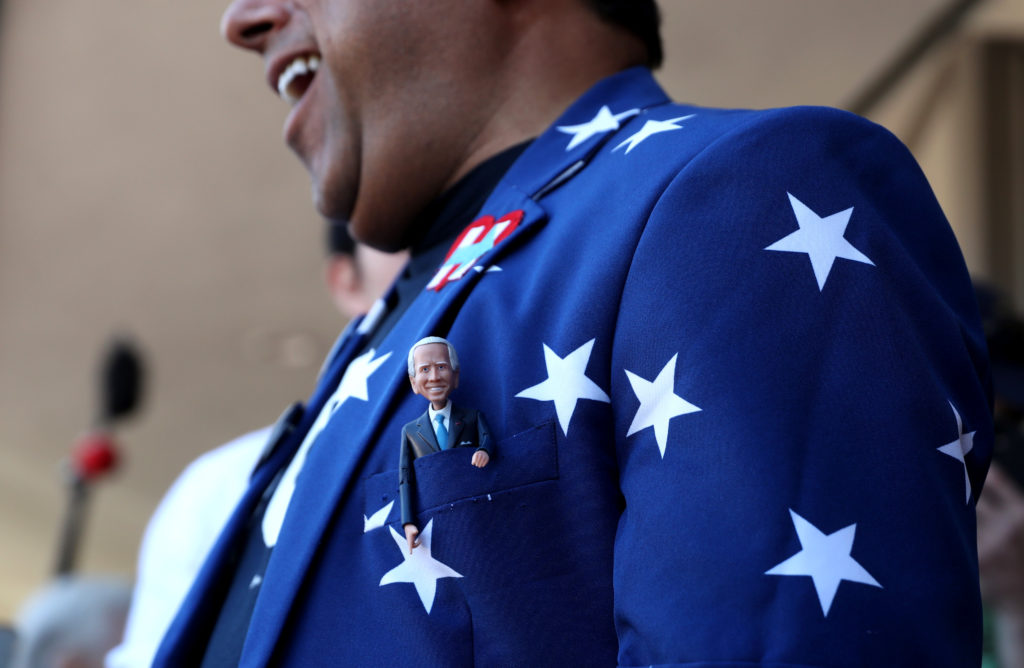Majority of queer voters favour the new kind of politics offered by Bernie Sanders and Elizabeth Warren, poll finds

Bernie Sanders (pictured) and Elizabeth Warren sharply split the LGBT+ vote in Super Tuesday. (Alex Wong/Getty Images)
Former vice president Joe Biden may have barreled to victory during Super Tuesday, but the bulk of LGBT+ voters voted for Vermont senator Bernie Sanders.
While she slid down the polls, the LGBT+ electorate also rallied for Massachusetts senator Elizabeth Warren. While the pair have emerged as bitter rivals, both have positioned themselves as progressive antidotes to disaffected voters.
Long a reliable voting block for the Democrats, around 42 per cent of LGBT+ voters ticked Sanders on their ballot box Tuesday, according to an NBC News exit poll.
Political analysts say that the tilt towards Sanders and Warren is of “no surprise”.
Four out of 10 LGBT+ voters backed Bernie Sanders, poll says.
Just less than one in ten voters identified as LGBT+, the results suggested. And 22 per cent backed Elizabeth Warren. Queer folk appear to be throwing their support towards the two most progressive candidates in the race.
But for Joe Biden – whose troubling track record for LGBT+ issues in the past has haunted him – attracted just 19 per cent of voters. Billionaire Michael Bloomberg, however, saw a tiny turnout of just six per cent.

Bernie Sanders watches Super Tuesday results as they come. (Salwan Georges/The Washington Post via Getty Images)
Bernie Sanders’ sweep of LGBT+ voters is unsurprising, considering the lawmaker’s decades-long support for the community. Similarly, Warren’s unwavering support for the community – especially among trans communities – lifted her political fortunes Tuesday despite her slumping position in the race.
Among non-LGBT voters, Biden blazed to the front of the race at a sturdy 34 per cent and Sanders trailing behind at 31 per cent.
LGBT+ voters typically lean left, where party nominee Hillary Clinton swept up as much of 78 per cent of queer voters in 2016.
‘No surprise’ that LGBT+ voters support Bernie Sanders and Elizabeth Warren.
Moreover, the poll, which surveyed 12 of the 14 states, found that Democratic LGBT+ voters are roughly double that of the national population.
Around nine per cent of Super Tuesday voters were LGBT+ in a country where 4.5 per cent identify as such, according to a Gallup poll.
Joanna Wuest, a postdoctoral fellow researching politics at Princeton University, that it was “no surprise” that LGBT+ voters slanted towards the progressive pair of candidates. In part, she said, because of their younger ages.
“Due to the worsening economic status of many folks under 30 and the economic disparities that exist in the LGBTQ population across ages, it would be no surprise if these voters were working-class or downwardly mobile professional types who have come to support redistributive policies like single-payer health care, a federal jobs guarantee or a student loan debt-forgiveness program,” Wuest said.

Elizabeth Warren finished third-place in her home state, Massachusetts. (Scott Eisen/Getty Images)
While one voter, 30-year-old gay man Toby Brooks, said that Sanders’ pro-LGBT+ voting record gives him security.
“When it comes to LGBT issues, his record kind of makes questions of his queer policy nonexistent,” Brooks said.
“I don’t really have to think about his support for queer people in any regard.”
Brooks proposed that LGBT+ voters may flock to Sanders’ revolutionary message because many have had to “understand how to live within systems of oppression.”
“You have no interest in upholding anything that intersects with the systems that oppressed you,” Brooks said.
What happened in Super Tuesday?
In a campaign defined by political gaffes and caucus blunders, Biden rebound into front-runner status sees him represent the tidiest way to keep a democratic socialist out of the White House.
This captures, political analysts say, how the Joe Biden and Bernie Sanders have become standard-bearers for their competing wings of the Democratic Party; Biden in the centre, Sanders on the left.

Joe Biden rebounded in the tussle to take-on US president Donald Trump thanks, in part, to endorsements from former rivals. (Justin Sullivan/Getty Images)
After Biden, once considered a spent force in the early caucuses, saw his campaign resurrected by their hasty unity after moderate rivals Pete Buttigieg and Amy Blocbuchar dropped their campaigns. Considering that having several moderate contenders once cannibalised the vote, now voters are coalescing around Biden.
He scored big in Texas, Virginia, North Carolina and at least six other states, including Elizabeth Warren’s home state despite never appearing in-person there; a devasting setback for Warren.
Whereas Sanders scored lopsided victories across some delegate-rich states – including the biggest prize of the night, California – and claimed voting lodes in Colorado and Utah and carried his home state, too.

